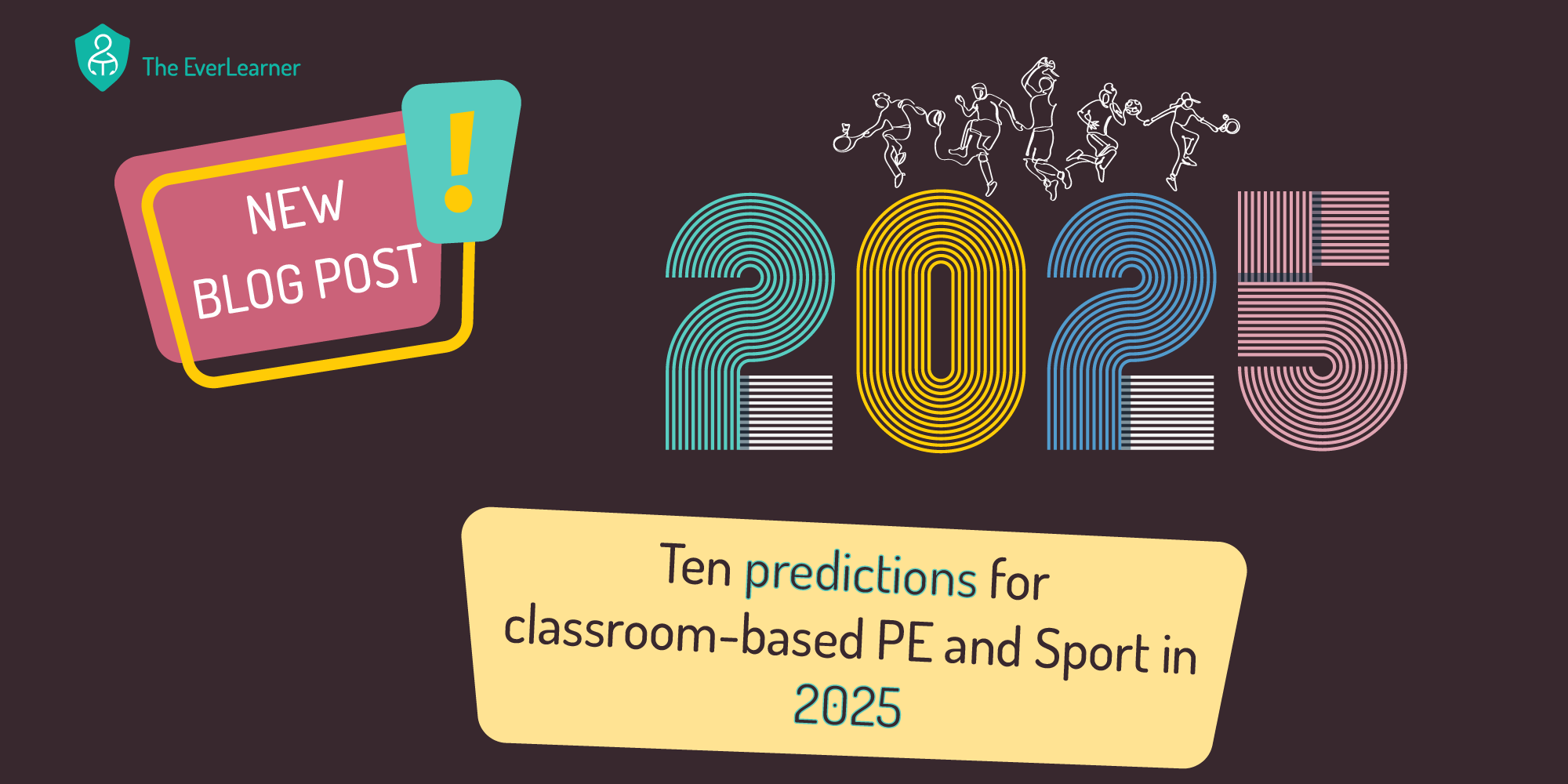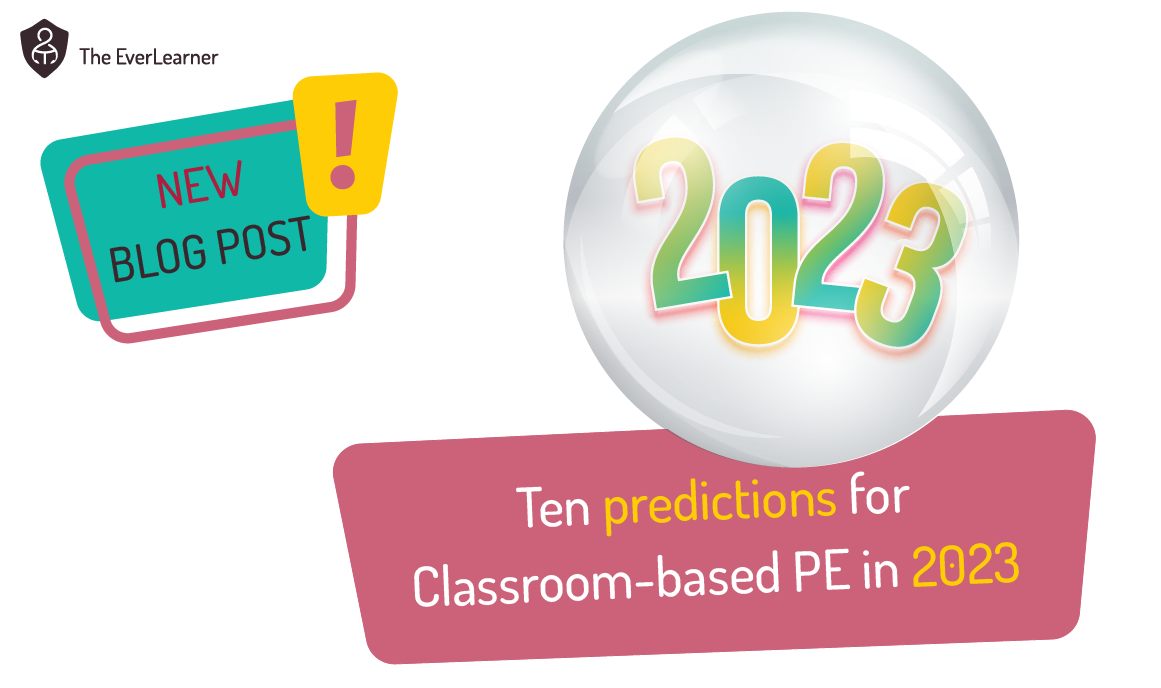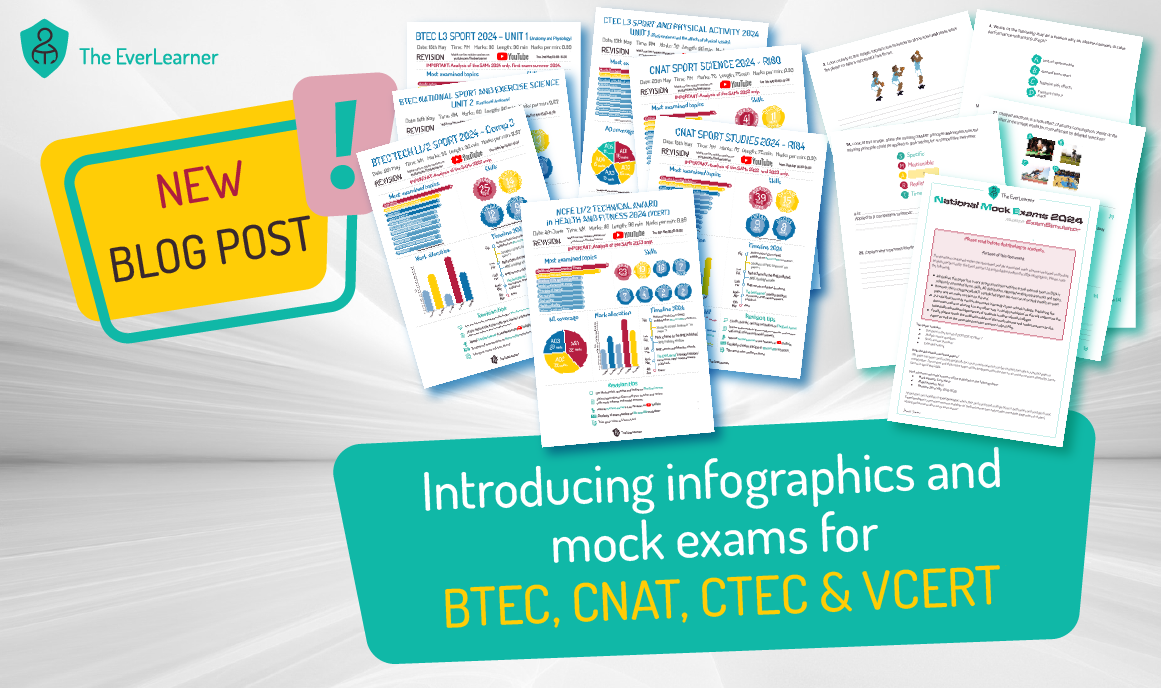Ten predictions for classroom-based PE in 2024
In late 2022, I wrote a blog post predicting what might happen in 2023 in relation to classroom-based PE teaching and learning. In response to that post, just over 12 months later, I want to review my predictions and make 10 further ones for 2024.
In late 2022, I predicted the following for classroom-based PE in 2023:
So, I managed to hit a respectable 7/10 for 2023. Given that the qualification review is completely out of my hands, I will only judge myself harshly on predictions 7 and 10.
Now for 2024! Here are my predictions for the 12 months to come. Remember, all of these predictions relate to classroom-based PE teaching and learning specifically.
Prediction 1: A review of GCSE and A-level PE will be announced.
Prediction 2: Significant concern will emerge over both examination experiences and coursework moderation for Cambridge Nationals and BTEC Tech Award.
Prediction 3: As a result of prediction 2, GCSE PE course numbers will “bounce”.
Prediction 4: The first-ever book written specifically about the discipline of classroom-based PE teaching will be published.
Prediction 5: TheEverLearner.com 2.0 will be launched.
Prediction 6: TheEverLearner.com 2.0 will change the PE teaching and learning sector forever.
Prediction 7: Subject-knowledge-based CPD will become the standard format of PE teacher CPD.
Prediction 8: “Spacing” will become a buzzword around PE classrooms.
Prediction 9: Writing skills will emerge as a major area of potential influence for PE teachers.
Prediction 10: Conversations will begin about the advent of a new type of (written/oral) coursework in PE qualifications.
Prediction 1: I repeat (from 2023), a review of GCSE and A-level PE will be announced
GCSE and A-level PE courses, along with other subjects, will be announced as changing from September 2025 or 2026. As you may know, I predicted this last year too and I missed! I strongly believe that a review of qualifications is just around the corner. My only reservation with this prediction is the likely political changes that may occur not before November 2024. Will this mean that political inertia proves me wrong? Maybe, but I also believe that a review is overdue. The last one was a decade ago and qualifications do need to be updated. Let’s see what plays out.
Prediction 2: Significant concern will emerge over both examination experiences and coursework moderation for Cambridge Nationals and BTEC Tech Award
I feel bad about this one because I already know it’s true. There is already serious concern about the efficient roll-out of technical qualification assessments at KS4. Whilst the reports that have been made to me can be considered only anecdotal, they happen to be anecdotal but also sourced from places and people I really respect. Amongst the concerns are the following:
- Appropriateness of pre-release materials
- Level of training provided to moderators
- Rigour of sampling within moderation
- Video recording requirements of the course
- Time allocation for non-examined units
All of these are real concerns and, in my opinion, critical concerns because all of them will directly impact on the experiences of both students and teachers. However, I have a bigger concern. Whilst this concern may relate to me specifically, I feel that I am uniquely positioned to express it. I am extremely concerned about the nature of the examined assessments correlated with the average cohorts that are being attracted to these qualifications.
Let me be clear: in recent weeks, I have been writing numerous national mock exams for BTEC Tech Component 3, Cambridge Nationals R180 and Cambridge Nationals R184. I have written these mocks, the associated mark schemes and the model answers based on the Specimen Assessment Materials (SAMs) provided by Pearson and OCR respectively. The exams are rigorous! I have written them as rigorous assessments of knowledge and skills. This, in my opinion, is a good thing. Assessments should be rigorous, thorough and challenging. However, I have also reflected on the pace of growth of the Cambridge Nationals, the difference between the new BTEC Component 3 exams and those of the legacy BTEC First and also the reasons that many centres have shifted from a traditional qualification such as GCSE PE to these new technical qualifications. Typically, teachers report to me that their Cambridge Nationals and BTEC choices are based on “appropriateness for their students” or “accessibility”. In other words, centres have chosen these qualifications so that students are likely to perform higher than they would on the GCSE equivalent. I believe, therefore, that colleagues and students might be in for a bit of a shock. Component 3 (BTEC) and R180 and R184 (both Cambridge Nationals) are tough. Very tough!
So, if I am right, the experiences that many PE teachers planned and hoped for may well not materialise. If I am right, we may see many centres looking to deviate from their assumed course offers in mid to late 2024. With these in mind, reason on to prediction three…
Prediction 3: As a result of prediction 2, GCSE PE course numbers will “bounce”
This prediction makes prediction 2 a six-pointer. This one will only occur if teachers do experience what I am predicting above. Despite ongoing declines in student numbers on GCSE PE since 2016, I am predicting that in Autumn 2024, more students will enrol onto GCSE PE courses than 12 months previously. In other words, GCSE PE is going to “bounce back” before any national refinement of the GCSE PE courses as a whole. Let’s see if this plays out.
Prediction 4: The first-ever book written specifically about the discipline of classroom-based PE teaching will be published
Oh, man! A year ago I was so confident that I would be a book author by now. It turns out I was wrong. More specifically, it turns out that writing a book is an experience of divergence-convergence. I have had a million ideas, rendered them down to something meaningful and then been hit by a load more ideas before repeating the cycle. So, with this in mind, I have made a promise to myself to accept imperfection and to get my writing out there.
Watch this space, folks.
For those of you who were interested in the fiction book I had mooted, I have chosen not to continue with that project. I was writing a crime (murder) thriller that was set in a school but I have concluded that it would be inappropriate of me to publish it. There are real tragedies out there and real crimes committed in schools sometimes and I felt that my writing would have been too close to some real events that were immensely tragic and sad in 2023.
Prediction 5: TheEverLearner.com 2.0 will be launched
During 2022 and 2023, Marta and I (founders of The EverLearner Ltd) were presented with numerous opportunities to “cash in” our ownership of The EverLearner Ltd. Let me be clear: businesses like ours gain attention from investors and acquirers and, for some time now, Marta and I have been contemplating our next moves. In the end, though, there was only one choice to make between two compelling options:
- Sell our “asset” and live a different life. Let’s call it retirement.
- Pull the arm on the bandit one more time and (commercially) risk everything in the pursuit of a dream.
Now, I want you to be really honest with yourself. Faced with that choice, what would you do? Would it depend on your stage of life? Your family’s well-being? The financial situation that you are in? For me, it was all these things but also the knowledge that, even with early retirement, I would not be able to let go of the dream that I have. Therefore, we (it was actually “I”... Marta always backs me in these types of big decisions), chose option 2 and I am deeply proud to tell you that our TEL 2.0 project is now firmly underway.
Rather than offering you timescales and features, I am going to share my mission with you:
I feel that this is my purpose, what I am here for, and I am going to give everything I can for the next cycle of my working life to achieve this aim. As I write this statement, I am 47 years old and I anticipate that the TEL 2.0 project will cycle through at least five years. Therefore, I am committing myself to this work for the foreseeable future.
If you would like to be part of the TEL 2.0 working party, please visit here.
Prediction 6: TheEverLearner.com 2.0 will change the PE teaching and learning sector forever
Clearly, this leads on from prediction 5. I simply want to add to my previous words that I refuse to aim for averageness or assumption or even commercial success in our new project. No! I aim for lasting, sustainable impact. I want to take PE as a whole with me: Every PE teacher; Every PE student; and provide a true experience of opportunity and improvement. This is my life’s work and I’m fired up. Watch this space. Seriously. Watch this space!
Prediction 7: Subject knowledge-based CPD will become the standard format of PE teacher CPD
I have dreamt of this for many, many years. On the negative side, I am concerned about the seemingly accidental nature of how PE teachers acquire their classroom-based PE subject knowledge, particularly in an era of online abundance. On the positive side, there has never been a better time than now to provide an all-encompassing CPD model for PE teachers. For these reasons, I can let you know that TEL 2.0 will feature dedicated experiences for PE teachers to improve their PE subject knowledge specifically. Once again, watch this space!
Prediction 8: “Spacing” will become a buzzword around PE classrooms
I’m confident that, in recent academic years, you have become aware of retrieval practice, interleaving and the importance of memory in qualification-based PE. However, “spacing”, whilst mooted at times, seems to remain a “later thought” in comparison to these other cognitive science considerations. It shouldn’t! Spacing (the practice of spreading learning experiences and practices over time) is a highly impacting, sustainable and relatively cheap way of improving memory retention and, if done well, the accuracy and pace of retrieval.
I will be blogging extensively about spacing during 2024 and I encourage you to switch on to the concept in advance. Once again, watch this space!!
Prediction 9: Writing and speaking skills will emerge as a major area of potential influence for PE teachers
I enjoy writing. During my adult life, I have become passionate about written communication, grammar and, specifically, the concept of “registers”. A register is a style of speech or writing that is used in the relevant context. For example, when I present at conferences, I use a very different register to the one I use when I’m chatting about football with my little brother. You’ll notice that some students are able to switch registers between a Snap message or Insta DM, to essay writing and that others… well, just seem not to be able to. This is a problem. It is a problem for them, it is a problem for us and it is also a problem for the whole school.
I have always believed that PE teachers are uniquely positioned to support students to improve their written and spoken language. PE teachers, like any sector, are hugely broad and every teacher is different. However, PE teachers seem different to students. On average, PE teachers don’t consider themselves to be linguistic experts. And here lies the key to this door. Because PE teachers don’t consider themselves linguistic experts, they are uniquely positioned to challenge secondary-aged students' assumptions about language. I am going to take this even further and suggest that the subject domain of PE is superior to all other subjects in its capacity to develop the registers of our students. Think about all the contexts that PE students operate in. Think about how many opportunities there are to model and practise different registers.
So, here’s a challenge to a good friend of mine, Lee Sullivan, author of 'Is PE in Crisis?' as well as the 'Concept Curriculum' and 'Concept Curriculum 2.0'. Lee, how would you respond to me if I was to suggest to you that one of the most fundamental concepts that PE could develop is language registers?
Let me know your thoughts on what I have written here. I would really appreciate it.
Prediction 10: Conversations will begin about the advent of a new type of (written/oral) coursework in PE qualifications
Once again I am cheating here because this has already begun and I am already part of the discussions. A long story short is this: PE written/oral coursework in qualifications like GCSE and A-level are considered by many –including me– to not be fit for purpose. I don’t want to spend my time bashing any exam board’s work or intent. Exam boards are filled with good people who want to do the right thing. Rather, I want to create a vision for what PE coursework could be.
In the future, I want PE coursework to achieve the following things:
- Be an expression of the dynamism and breadth of the PE subject domain and subject skills.
- Be personalised.
- Be a celebration of a student’s passion for the subject.
- Be a world-class learning experience that genuinely supports a young person’s skill set for the future.
If you read those four objectives and think “It would be nice, but…”, I have a question for you:
Seriously, what are they? Because we should be tearing them down together. I’m afraid to state this opinion but it’s my blog. So, what the hell: traditionally, PE coursework has been assumption-based and targeted at the average. We have to move away from that and, given the opportunity, I will be the one driving the conversation.
For the final time: watch this space.
So, there you have it: 10 predictions, all of which are a bit “out there”. What do you think? What would your 10 predictions be? I would really value hearing or reading your thoughts.
Thanks for reading
James
%20Text%20(Violet).png)


